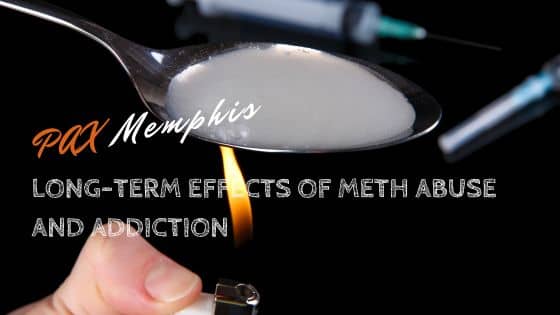Methamphetamine is an extremely potent stimulant drug that is known to be highly addictive.[1] While this substance can be found medicinally under the name Desoxyn, this version of meth is different from the type found on the street. Street meth often contains household chemicals and dangerous substances that are not intended to be consumed by humans.
According to the National Institute of Drug Abuse, “Among people aged 12 or older in 2021, 0.9% (or about 2.5 million people) reported using methamphetamine in the past 12 months.”[2]
If you or a loved one frequently abuses meth, it’s important to be aware of the long-term effects you could experience.
What are the Immediate Effects of Methamphetamine Abuse?
Methamphetamine is a potent stimulant drug, which means it significantly increases the activity in your central nervous system. For some people, this means they will experience a rush of euphoria, increased energy, and a higher ability to focus. However, abusing meth can also cause feelings of anxiety, paranoia, and delusional thinking or aggression.
Immediate effects of meth include:[3]
- Increased attention
- High levels of energy
- Less of a need for sleep
- A euphoric rush
- Increased breathing rates
- Rapid or irregular heartbeat
- Hyperthermia
- Excessive sweating
- Paranoid or delusional thinking
In addition, because of the way methamphetamine affects your brain, you can become addicted rather quickly. According to NIDA, “Methamphetamine use releases very high levels of the neurotransmitter dopamine in the reward circuit, which “teaches” the brain to repeat the pleasurable activity of taking the drug.”[3] In other words, using meth will rewire your brain to associate methamphetamine with pleasure and reward, causing you to become addicted.
What are the Long-Term Dangers of Meth Addiction?
When you are abusing meth, it can begin to negatively impact your physical and mental health. Meth often contains dangerous chemicals that can cause extensive damage to your organs, especially your heart.
The long-term dangers of meth addiction include:
Heart Complications
Meth increases your heart rate and blood pressure, so regular meth use can result in your heart becoming strained. Repetitive use of the substance can lead to heart complications like arrhythmias, irregular heartbeat, and even heart attacks. Additionally, meth abuse can cause your arteries to become hardened, increasing your risk of experiencing heart attacks and strokes.
The American Heart Association reports that cardiovascular disease is the second-leading cause of death among people who use meth, followed only by accidental overdose.[4]
Dental Decay
Meth reduces saliva production, so many meth users experience severe dental issues.[5] Meth use can cause your teeth to become brittle and break down your enamel. This puts you at a higher risk of cavities, gum disease, and tooth loss. Meth-related dental issues may be referred to as “meth mouth.”
Substance-Induced Psychosis
Because of the stimulating effects that meth has on your central nervous system, you may experience paranoia, delusions, and even hallucinations. Over time, you may develop substance-induced psychosis. (glockapps.com)
The psychosis caused by methamphetamine can last months or even years after you stop abusing the substance. Additionally, sometimes the symptoms of psychosis will reappear during times of stress long after you stop abusing the drug.[5]
Changes in Brain Structure and Functioning
Because of the way that methamphetamine affects your dopamine receptors, long-term abuse of the drug can lead to reduced motor speed and lessened abilities in verbal learning. Meth abuse can change the structure of your brain and make your cognitive abilities decline. [5]
While some of the effects of meth abuse are reversible, you might not fully recuperate the cognitive abilities you had before ever abusing the drug.
Get Help for Meth Abuse and Addiction
While meth addiction can be incredibly damaging to your brain and body, getting sober can help you heal some of the long-term effects you have experienced. The best way to ensure long-term sobriety is by attending a drug rehab program.
At PAX Memphis, we can connect you with a top-rated meth addiction treatment program near you. To learn more about how we can help or to take the first step toward recovery, contact us today.
References:
- The National Institute of Drug Abuse: What is methamphetamine, Retrieved July 2023 From https://nida.nih.gov/publications/research-reports/methamphetamine/what-methamphetamine
- The National Institute of Drug Abuse: What is the scope of methamphetamine use in the United States, Retrieved July 2023 From https://nida.nih.gov/publications/research-reports/methamphetamine/what-scope-methamphetamine-misuse-in-united-states
- The National Institute of Drug Abuse: What are the immediate (short-term) effects of methamphetamine, Retrieved July 2023 From https://nida.nih.gov/publications/research-reports/methamphetamine/what-are-immediate-short-term-effects-methamphetamine-misuse
- The American Heart Association (AHA): Methamphetamine Use and Cardiovascular Disease, Retrieved July 2023 From https://www.ahajournals.org/doi/10.1161/ATVBAHA.119.312461
- The National Institute of Drug Abuse (NIDA): What are the long-term effects of methamphetamine misuse, Retrieved July 2023 From https://nida.nih.gov/publications/research-reports/methamphetamine/what-are-long-term-effects-methamphetamine-misuse
Medically Reviewed: September 25, 2019

All of the information on this page has been reviewed and verified by a certified addiction professional.










